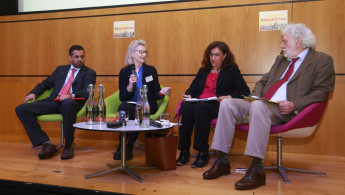Turbulent days ahead for Saudi Arabia, say Riyadh analysts
Organised by regional news site Middle East Monitor, the conference was broken up into three parts, looking at the latest developments in the kingdom, human rights in Saudi Arabia, and the country's economy under Mohammed Bin Salman's ambitious Vision 2030 project.
Reforms under the second-in-line to the throne were analysed from various viewpoints, with the panel looking at the possible implications of the crown prince's actions and growing power.
London-based Saudi academic Professor Madawi al-Rasheed emphasised that recent developments in women's rights are tokens used for the political elite in Riyadh for their own gains.
She said that within the context of the behaviours of bin Salman, he has no genuine drive for change in the kingdom and is appropriating the issue of women's rights for his own personal gains.
Dr. Pierre Conesa, a lecturer at the Paris Institute for Political Studies, said the developments in Saudi Arabia must be viewed through the monarchy itself and the so-called "Wahhabi" ideology it follows.
Later on in the conference, journalist Hugh Miles questioned descriptions of Saudi government's actions as "Wahhabist" in the media, stating that Riyadh has no real ideology and is only concerned about its own interests.
The Yemen conflict - which intensified when Riyadh entered the war in 2015 - was also brought up by Professor Ahmed al-Dubai, a Yemeni analyst.
He assessed Riyadh's current adventure in Yemen - which has brought about a major humanitarian crisis in the country - in the context of Riyadh and Sanaa's troubled relationship, which has been marked by mutual distrust since the 1930s.
When talking about the government of Yemen President Abd Rabbo Mansour Hadi - which is allied with Saudi Arabia - he said Riyadh does not want partners, only "followers".
 |
Saudi Arabia does not want partners - it wants followers |  |
The second session analysed the human rights situation in Saudi Arabia and how it has deteriorated under bin Salman.
Saudi exile Yahya Assiri spoke of the totalitarian nature of the regime, which has worsened after new counter-terrorism laws were introduced.
The loose definition of "terrorism" under the legislation, and the cryptic definitions of "acts of terror" - which applies to "preventing authorities from doing their job" - means essentially anyone can become a target of the law.
Articles in the anti-terror legislation include indefinite periods of detention and solitary confinement.
The third session debated the stability of the Saudi economy and where it might lead to.
Riyadh's dependency on its oil economy was discussed, but also in the context of the political instability in Saudi Arabia.
Economics commentator Simon Constable questioned the ability of bin Salman to carry out Vision 2030 if his erratic leadership continues, which could scare off potential foreign investors.
The conference finished with a keynote speech from former UK Foreign Secretary Jack Straw, who described the instability that Riyadh's opacity can induce.
Overall, the conference gave an excellent alternative analysis of the mainstream perceptions of the Saudi kingdom and critically examined the developments in Riyadh from various angles.
A number of topics such as women's rights, the war in Yemen, recent economic developments, and a purge of royals and leading politicians were explained and debated, to give a rich and nuanced discussion on the past, present and future of Saudi Arabia.



